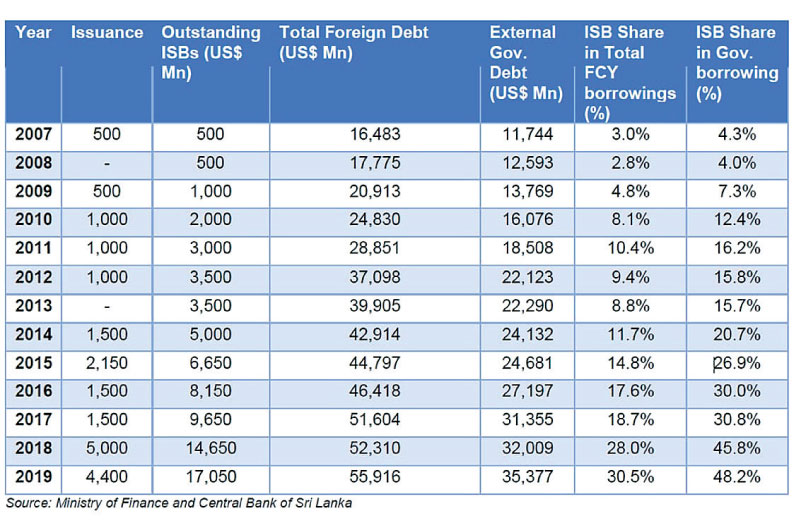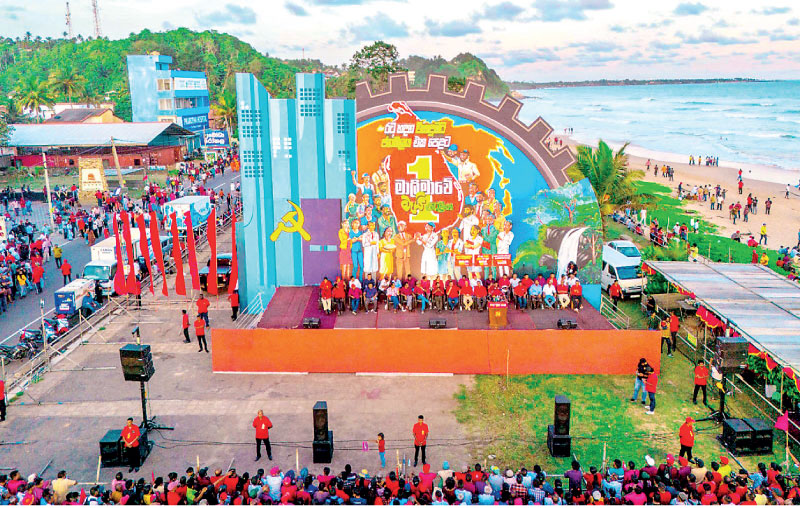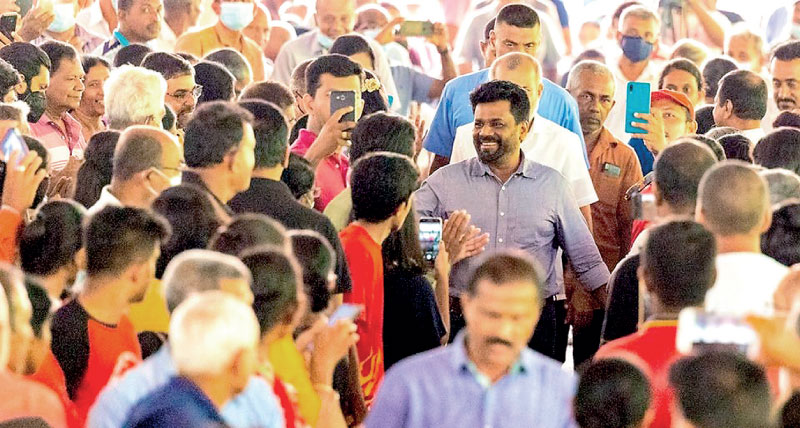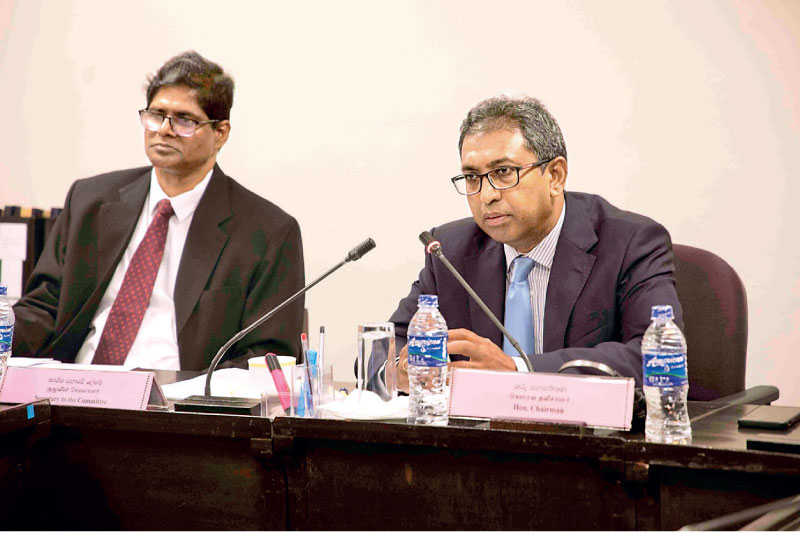Saturday Feb 14, 2026
Saturday Feb 14, 2026
Thursday, 16 May 2024 00:40 - - {{hitsCtrl.values.hits}}

Note jump in ISB borrowings

Rebalancing the polity

The Outsider as the Equaliser
“For things to remain the same, everything must change.”
– The Leopard, Guiseppe di Lampedusa
 Basil Rajapaksa’s idea of a snap Parliamentary election proceeds from the ruling party’s viewpoint that it has a better chance of survival while its partner Ranil holds office and controls the administration.
Basil Rajapaksa’s idea of a snap Parliamentary election proceeds from the ruling party’s viewpoint that it has a better chance of survival while its partner Ranil holds office and controls the administration.
There is no guarantee though, that if and when that Parliamentary election is held, Ranil won’t tell the country “Ok, now you’ve had your election for this year”, and press ‘pause’ on the scheduled Presidential election.
That is almost exactly what happened in 1982. We had one national election but not the other. The Presidential election was in October 1982, and JR Jayewardene won. The Parliamentary election was scheduled for early 1983, but a Referendum was held instead in December 1982 which the UNP coercively and fraudulently won, and the Parliamentary election was postponed. That lit the fuse that led to Black July 1983, two civil wars (North and South), and foreign military intervention.
Under JR Jayewardene, the more important election, the Presidential, was held, while the relatively less important, the Parliamentary, was postponed, and we plunged into endless war. What if the sequence is reversed this time around by nephew Ranil, and the lesser election, the parliamentary, is held, while the more important, the presidential is postponed? Unlike in the 1980s, we shall be stuck with an unelected President while painful debt restructuring proceeds. Logically, the consequences will be far worse than in the 1980s.
TINA variations
In this crucial, increasingly compressed time of transition (several months), it is all the more important to keep things rational and realistic. However, on important subjects one sees and hears too many ideas which are irrational, unrealistic or insufficiently thought-through.
Let’s take a few chorus lines. One is the raucous ideological tribal chant against socialism, communism, Marxism, Leninism etc. An SJB blurb actually denounced the “Marx believers” (“Marx bakthikayin”).
Another is the strongly held belief that any deviation from the present course and policies would be a disaster. This is a variant of the Thatcherite neoliberal cliché from the 1980s and early 1990s, long abandoned in most of the world, that “there is no alternative” (notorious for its anagram TINA).
Yet another holds that the Wickremesinghe administration’s taxation policies are to the left of that of its critics; therefore, it is progressive to endorse them, hypocritical for the left to reject them.
|
Sajith the Enabler
|
Socialist Red Herring
Those who make this an ideological war between capitalism and socialism are engaging in an imaginary contest. Of course, the JVP, which is the motor-force or guiding factor of the NPP, is a party that would regard itself as socialist, communist and Marxist-Leninist, and so it is, though not in any dogmatic or doctrinaire sense. It is not proposing anything that is in the least socialist, and is coming in for heavy stick precisely for not doing so, from its main rival on the left, Kumar Gunaratnam’s Frontline Socialist Party.
Kumar says interestingly, that even when the JVP made the mistake of allying with mainstream capitalist parties under the latter’s leadership, it did so while retaining its socialist goals, but over recent years, for the very first time since its founding in 1965 it has abandoned the socialist project and has firmly relocated itself and its economic ideas in the same domain as its mainstream electoral rivals, i.e., that of capitalism, of this or that model.
I’d add that Europe is full of parties named Socialist and some are governing parties (e.g. Spain), but that in no sense means that their economic programs are socialist. Latin America is studded with parties that were far more revolutionary and hardcore communist than the JVP (e.g., El Salvador’s FMLN), and some have been repeatedly elected to the presidency. None has sought to introduce ‘socialism’ just as Germany’s Christian Democrats never tried to make Germany a Christian state.
The only political party that invokes Marx, Engels, Lenin, Communism, Socialism and Revolution today, is the SJB. Sometimes, ignorance places it ideologically to the right of the UNP. A smart young ideologue of the UNP, a Provincial Councilor named Waruna Rajapaksa who was with the FSP in 2011-2012 but defected later, put the NPP’s intelligent young spokesperson Chathuranga Abeysinghe on the backfoot in a TV debate by brandishing a tattered volume of Lenin, quoting from it, and accusing the NPP of having travelled backwards from Lenin on the question of domestic labour and technology. There is no SJB personality politically literate enough to do that.
What the nonsensical introjection of Cold War ideological rhetoric by the Center-Right/Economic Right does is to ensure economic instability over the next few years, because ideological polarization makes for permanent political warfare and gridlock which in turn render post-election consensus impossible. Sajith should not be the boy who cried “wolf”.
Argument for an alternative
The slogans “there is no alternative to the present path”, “any deviation is an experiment and any experiment is dangerous”, are dangerous. The social statistics highlighted by the Department of Census and Statistics, the UNDP, UNICEF and most recently the World Bank, show poverty and inequality worsened by the present policy dispensation path; arguably engendered by it as a by-product. To do other than ‘deviate’ to some degree from it is to urge the acceleration of a vehicle along a course that will take it over a cliff into the deepest abyss; far deeper than the one we are now in.
What we should be discussing is the degree and direction of the imperative deviation from the present path.
The reasons should be self-evident but aren’t to a blinkered elite:
 Sri Lanka had two unarmed mass upheavals that threw out incumbents: Hartal 1953, Aragalaya 2022. Both had economic determinants.
Sri Lanka had two unarmed mass upheavals that threw out incumbents: Hartal 1953, Aragalaya 2022. Both had economic determinants.
 Sri Lanka had three civil wars, two of which were in the South and both of which had economic propellants or accelerants.
Sri Lanka had three civil wars, two of which were in the South and both of which had economic propellants or accelerants.
 In the second Southern rebellion, external intervention added fuel to the social fire.
In the second Southern rebellion, external intervention added fuel to the social fire.
 Today’s combination of socioeconomic inequity and external encroachment is highly likely to detonate an explosion.
Today’s combination of socioeconomic inequity and external encroachment is highly likely to detonate an explosion.
If that outcome is to be averted, two things are necessary, both of which are feared rather than embraced in unenlightened social and policy circles:
 Elections on schedule, i.e. political change, be it the SJB or the NPP, Sajith or Anura.
Elections on schedule, i.e. political change, be it the SJB or the NPP, Sajith or Anura.
 A deviation from and a diversification of the present economic path to a multi-track one; a recalibration of the present formula/agenda to ensure accelerated upliftment from poverty and greater socioeconomic equity.
A deviation from and a diversification of the present economic path to a multi-track one; a recalibration of the present formula/agenda to ensure accelerated upliftment from poverty and greater socioeconomic equity.
Illegitimate taxation
What of the critique of the JVP-NPP endorsed backlash against Ranil’s increase of direct taxation? The argument is that heavy direct taxation is a centre-left policy while low taxes are a rightist or populist-rightist policy. Generally, this is true, but it turns a Nelsonian eye on the Sri Lankan elephant in the room.
We have an unprecedentedly radical, harsh economic agenda being implemented at ‘warp speed’ by an administration which is unprecedentedly unrepresentative in our post-Independence history. As ex-President Mahinda Rajapaksa indicates, Wickremesinghe is an ‘interim’ President. We’ve had one before, DB Wijetunga, BUT he was twice elected, at successive general elections to parliament, from where, as President Premadasa’s Prime Minister from 1989, he was elected to the Presidency by the sitting MPs after the Premadasa assassination. Wijetunga eschewed any policy adventures.
There is collective existential angst in Sri Lanka. The citizens are not willing to countenance higher taxes or any other painful economic measure from a leader they did not freely and collectively choose. The educated—the academics and professionals—are the most outraged and least compliant.
That shouldn’t be too difficult to get one’s head around: “no taxation without representation” was the initial slogan of the American Revolution, the first modern revolution. Ceylon’s 1848 rebellion was also triggered by high direct taxation.
Continuity needs change
If there is to be quintessential systemic continuity, there has to be political discontinuity. Nothing and no one short of a freely elected leader of the nation stands a chance of securing the broad public buy-in for any restructuring agenda.
Though an imperative, political discontinuity is not a sufficient condition for social consensus. That requires policy reform and revision which ensure greater equity. If not, even a newly elected government can experience a social explosion—recall that the first insurrection, April 1971, was a generational rebellion against a government that was a year old.
If the chance to choose the nation’s leader is delayed and the present economic program continues, a composite political and socioeconomic explosion is guaranteed.
If the SJB wins and the ensuing course is that of the Economic Council and its Economic Blueprint rather than (Ranasinghe) Premadasa’s path, there will be an explosion --as Dudley Senanayake, elected in 1952 experienced in 1953, and Sirimavo Bandaranaike, elected in 1970 faced in 1971.
Therefore, contrary to the call for maintaining continuity as precondition of stability which in turn is precondition for economic recovery, any prospect of stability and sustainable economic recovery requires dual-dimensional change: Sept-Oct presidential elections and a rebalanced economic program.

Harsha: Defender of ISB surge
Contrasting options
The SJB’s approach is top-down, the JVP-NPP’s, bottom-up. The SJB promises to secure maximum external support and resources for the country. The JVP-NPP promises to build the economy from a revamped, reinforced foundation.
On the economy, the SJB talks at the people, not for the people. AKD and the JVP-NPP talk to the people and for the people.
The SJB revives the pre-Premadasa (pre-1989) and post-Premadasa (post-1993) UNP economic ideology. Its Economic Blueprint is soaked in the old technocratic Lalith-Gamini-Ranil UNP ideology, not President Premadasa’s. What is new in the SJB economic discourse is its invocation of new technologies.
Anura Dissanayake has a new message, and the JVP-NPP aims for the new: a new generation, new outlook and attitude, new public consciousness and a new Social Contract for a new economic surge.
Anura’s approach and development discourse sound more grounded – though not insular - than that of his rivals. The UNP-SJB model is externally propelled. It prioritises external requirements and interests rather than internal ones. This is the model which the renowned Samir Amin, once thought to be a serious contender for the Nobel Prize for economics, critically designated as ‘extraverted’ and ‘neo-comprador’, resulting inevitably in ‘maldevelopment’.
Amin commended instead, an ‘autocentric’ model, which in no way meant autarchy, but rather, a model primarily propelled by summoning the country’s internal strengths and which prioritizes internal (national) needs and interests over external (foreign) ones.
AKD has excellent ideas about the diversification and promotion of exports, while his strategy is predicated on a strong national base, unlike that of the UNP and SJB. (https://www.youtube.com/watch?v=MZHSQQC5ugE) That’s an ‘autocentric’ model, which in his later writing, Samir Amin placed under the rubric of a ‘national-popular project’ in contradistinction to a ‘neo-comprador’ one. Anura and the JVP-NPP’s project is ‘national-popular’; the UNP’s and the SJB Economic Council’s project is not.
International financial slavery
Having watched Dr. Harsha de Silva’s detailed exposition of May 6th on the private international debt (Face To Face | Dr. Harsha De Silva | (youtube.com), I doubt the SJB will best represent the nation in negotiation with private creditors.
Harsha belonged to Ranil’s economic team which switched to high-interest ISBs from low-interest bilateral loans, borrowed several times more in the international private money-markets than Mahinda ever had and raised the ISB share in Government borrowing from 20.7% in 2014 to 48.2% in 2019 (See chart by Ministry of Finance and CBSL).
The SJB shadow Finance Minister’s explanation is that 89% of the UNP’s ISB debt was to pay-off the interest of Mahinda’s debt. That’s a shadowy explanation.
 What was the total sum of the accumulated interest on MR-presidency debt that had to be paid during the Yahapalanaya UNP years, and by exactly when. What was the figure? Where’s the proof?
What was the total sum of the accumulated interest on MR-presidency debt that had to be paid during the Yahapalanaya UNP years, and by exactly when. What was the figure? Where’s the proof?
 Once we have verifiable answers, we can then match the dates and see whether racking up ISB debt at the times that Ranil’s economic team chose to do so, at those rates, was justified.
Once we have verifiable answers, we can then match the dates and see whether racking up ISB debt at the times that Ranil’s economic team chose to do so, at those rates, was justified.
 Was the ISB surge the best possible option in the national and public interest?
Was the ISB surge the best possible option in the national and public interest?
 Why choose to pay off interest with the most expensive proposition: the high-interest private money-markets?
Why choose to pay off interest with the most expensive proposition: the high-interest private money-markets?
 Why incur higher interest on new loans to pay lower interest on old loans?
Why incur higher interest on new loans to pay lower interest on old loans?
 Why not use the US $1.1 billion they raised from the (very) long-lease of Hambantota, and/or choose low-interest bilateral and multilateral sources?
Why not use the US $1.1 billion they raised from the (very) long-lease of Hambantota, and/or choose low-interest bilateral and multilateral sources?
Pardon my scepticism but this was the same administration and the same governmental term under which the Central Bank bond scam was perpetrated.
Ranil’s 2015-2019 economic team, including members of Sajith’s Economic Council which authored the SJB’s Economic Blueprint, sold us Sri Lankans for generations to come, into lifelong international financial bondage, rather like the slavers who sold the African people into lifelong physical bondage. Those who took the decision to surge on ISB debt should be investigated by a Special Presidential Commission for an economic crime against the nation. (https://www.colombotelegraph.com/index.php/debt-restructuring-as-rocket-science-the-imf-green-blue-pink-washing-blackrock/)
The shared IMF-UNP-SLPP-SJB strategy is to enable Sri Lanka to borrow in the private money-markets again, i.e., return to private debt-addiction. This just isn’t right or fair by the people.
Harsha remains unapologetic and insists on uncritical, unquestioning compliance with ISB debt repayment. He finds the term “odious debt”, odious. As Rajiva Wijesinha, deputy chairman when COPE chaired by DEW Gunasekara investigated the Central Bank bond scam reminded a Marga audience recently, Harsha was one of the ‘footnote crew’ which was a whitewash crew. Ranil calls him a protégé and channels decentralized development funds to him but not to most other SJB MPs. He has consistently backed Ranil’s economic decisions.
The JVP-NPP didn’t put us in debt slavery. It can give the people stronger voice, better ‘trade union’ representation in the negotiations with the international private bondholders.
Anura and allies
Every elected President in Sri Lanka won over 50% in the first round. Even if AKD ultimately wins but has failed to exceed the 50% mark in the first round as did all predecessors, his administration will have an intrinsic deficiency and vulnerability.
The JVP-NPP is ignoring a major part of Marxist political science and strategic thought or what Louis Althusser called ‘strategic science’. It is precisely to win over what Marxism calls the ‘vacillatory intermediate classes and strata’, and to build a decisive strategic majority, that the crucial doctrine of the ‘united front’ was arrived at through bitter historical experience.
Since 1921, beginning with Lenin and through to Fidel Castro, the theory of the united front is born of the conceptual comprehension that no single political party, even taken together with its mass fronts, can represent an entirety or an absolute majority of a class, a people, a nation or a democratic camp. This is especially – but not exclusively--so in a complex society with experience of universal suffrage.
Other than the long-established Labour parties and Social Democrat/Socialist parties of the First World, no Left party or candidate has won a democratic election except with fronts, alliances, partnerships. Anura needs allies outside and beyond the NPP.